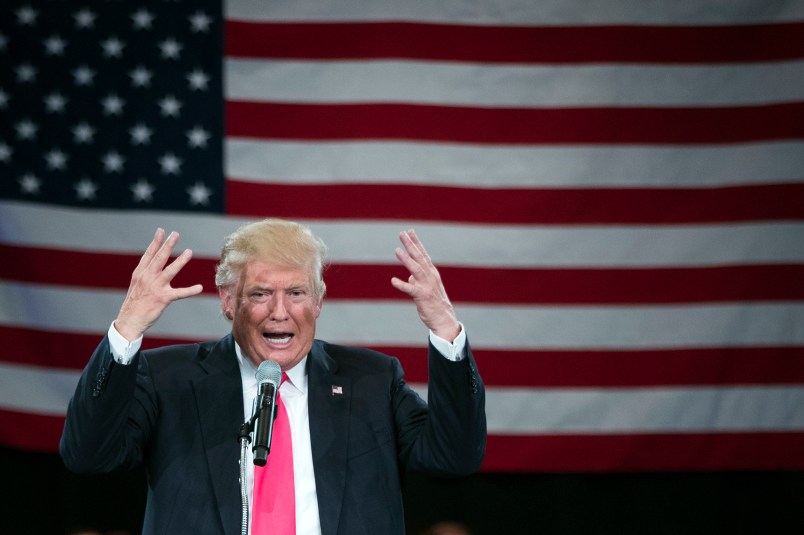In turbulent and interesting times such as these, as Donald Trump rumbles on from outrage to outrage, we’re all on the look out for people who take some courageous or moral stand. Is this or that Republican taking a stand against Trump and saying they can’t support him? This is natural. Because we look for inspiration, validation or moral example. But what makes these stories compelling is precisely because they break with the fabric of political interest. We assume it’s not the safe or self-interested thing to do. And in that way, focusing on the hold outs, few as they are, obscures the much more significant reality.
I’ve noted several times recently that for all that we’ve seen from Donald Trump – Curiel, Khan, wink wink calls for murdering political opponents – Paul Ryan, Mitch McConnell, John McCain, the institutional apparatus of the RNC all remain as active endorsers of his candidacy and say they believe he should be the next President. That is an astounding fact. We can say that it shows a bracing lack of principle or political courage. And that may all be true. But again, it’s not the most important point. What’s really most important is that each of these people believe that the center of gravity in the GOP is pro-Trump and that their political futures would be damaged by turning against him. That is the big deal, far more important than this or that single person being admirable by bucking the tide.
Earlier this week I asked the question whether Trumpism would outlive Trump’s campaign. What I’ve just described above tells us pretty clearly that it will and that the GOP is now a Trumpite party and will remain a Trumpite party. To get a little more specific, this means that the white ethno-nationalist party which Trump has brought out of the shadows and mobilized is now and will continue to be the Republican party. You can see that future in Stephen Miller, the Sessions staffer who was first seconded to the campaign and now appears the genuine ideologue articulating the policy agenda of white nationalism, apart from the occasional shopping list of GOP talking points that we heard in the most recent economic speech. Notably, it was Miller, working at Sessions’ behest, who organized the defeat of immigration reform in 2013 – a critical harbinger of Trumpism. This is no aberration that will snap back into the pre-2016 place after November.
I grant that there’s a less dramatic way to interpret the evidence. We might say this: It’s not that the GOP is now a Trumpite party but that there’s a faction of committed Trump supporters, perhaps 10% to 20% of the party. And no politician has any interest in antagonizing them because those folks will make trouble or be out to get you down the road. If you want to run for President in 2020 or having a easy reelection in 2018 you don’t want the Trumpers lined up against you. But the difference between these two ways of looking at the evidence aren’t as different as they seem. If Trumpism were simply a loud and radical faction within the GOP, there would be some comparable faction opposing it, raising stakes and consequences for those who supported him. But there’s not. In other words, the size of the Trumpite faction within the GOP (and I’d argue it’s quite large) is beside the point because it demonstrably rules the GOP.
It’s now apparent that there is nothing Trump can do, no outrage he can commit that will lead them to withdraw their support. That’s the real story. And I see little reason to believe that will change after what looks like Trump’s highly likely defeat in three months.
There are many, myself included, who’ve argued for some time that the current GOP was already the functional equivalent of one of the Europe’s rightist-nationalist parties masquerading as a mainstream center-right party – much more like France’s National Front than the British Tories. So by this reasoning there’s really no change. This is what the GOP has been for years. We’re just seeing it more clearly now.
But this really isn’t quite right either. What I’ve described here may have been the underlying reality of the GOP in the 21st century. But it still nominated John McCain and Mitt Romney, two fairly conventional center-right politicians. It had congressional leaders like John Boehner and Paul Ryan. Now Trump has said out loud what was already rumbling underneath the surface of 21st century Republican politics. He’s normalized a litany of statements and actions that were political verboten, at least from the party’s leadership. He has activated the voice of GOP white nationalism, spoken its language out loud and in so doing made it conscious of itself and expanded its ambitions. This seems like a transformative event. Maybe party leaders can stuff the energy of the white nationalist base back within a McCain/Bush/Romney package. I’m sure they will in a limited sense that Ryan and McConnell will remain the party’s congressional leaders. But on the broader level, I doubt it.






